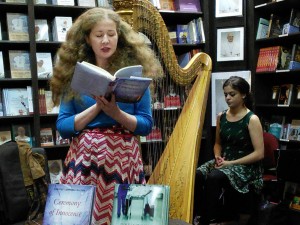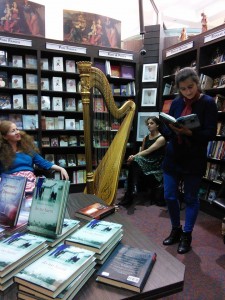My doting husband and I took the train to London this weekend to promote Ceremony of Innocence and support another Ignatius Press novelist and a Catholic book shop in the process. Our expenses, which came out of our savings, were approximately £678, which is to say, the British equivalent of $1,137.27.

To put this into perspective, London is an expensive city, and we neither ate at McDonald’s nor confined our sightseeing to churches. So you may subtract £200, or $335.45, to get a reasonable picture of what it costs to go by train to London from Edinburgh and stay in a budget hotel for a weekend.
London, of course, is a city of endless cultural delights and, in our case, dear friends. We visited museums and churches, attended Mass and feasted with pals. But, naturally, we hoped to sell a lot of books, too. This, as I more than once reminded my museum-crazed husband, was our reason for going.
The reader may now feel a trifle confused, wondering why we do not just leave the selling of books to sales professionals. And the reason why, dear reader, is because author appearances sell books. I have it on the authority of the saleswoman whose job it is to sell my one Polish book that its sales perk up when it is announced that I am on my way to Poland and collapse again when I leave.
Tip 1. Public appearances of authors sell books.
Unless Oprah has come across her book somehow, the best saleswoman of a book is the author herself. But this is a tad paradoxical in both Canada and the UK, where authors are naturally diffident and feel embarrassed about shouting “Buy my book!” at strangers. We fear being labelled “shameless self-promoters.” And this is why we need to work with such allies who understand how it will profit it them to help us promote our books. As it is their job is to sell books, nobody will call them names for selling them.
Therefore, it behooves the author who wishes to promote her work to hie herself to a bookstore and ask for professional help.
Tip 2. Pick the right book shop.
My favorite book shops in the world are the ones that carry my book. When I dropped by Toronto’s wonderful Crux Books, I gave its “New Arrivals” a sweeping glance. There was my baby Ceremony of Innocence, nestled on the shelf. I rushed to the counter and asked to speak with management.
To be honest, I had already had a book event hosted by Crux Books three years before, organized by my Toronto publisher Novalis. Crux was particularly interested in that, my first, work because I am a graduate of the Toronto School of Theology, to whom Crux sells course books. Thus, I suggest to authors that when they make their pitch to a bookshop, they stress their particular relationship to it. To Edinburgh’s Blackwell’s Books, I stressed that they are my favorite Edinburgh bookshop, which is quite true. I go there every week and visit the two volume Polish dictionary which, at £95, I cannot quite afford.
Tip 3. Make your mutual expectations clear.
In a world of internet sales and costly overheads, author appearances gives ordinary book shops a momentary edge. Many book shops have had many author appearances before, and will tell you up front how many people they expect and what they can provide. For example, Crux Books in Toronto provided me with a room that could seat 60, a saleswoman to introduce me and sell the books, chairs and coffee, tea and biscuits for the listeners. They also promoted the event by email to the Toronto School of Theology and over their blog. Homo Dei in Kraków sends a saleswoman with a box of books to sell during my appearances at the Redemptorists’ Kraków retreat house. Saint Paul’s Book Shop in London ordered in the books, gave Fiorella de Maria and me a table, and left the rest up to us. This hands-off effort proved to be less effective in terms of sales.
My contribution to book shops, at this stage, is to estimate how many people I can get there, get them there, arrive on time and give a good performance.
Tip 4. Promote the event however you can.
In my experience, the largest percentage of people who come to my appearances (outside Poland) are family and friends, usually alerted by Facebook. Another significant group includes habitual readers of my blog. Another comprises friends of friends. The smallest group are complete strangers whose attention was caught by posters, the shop’s emails or the sound of my reading. Although greatly tempted, I have not yet bought advertisements in local Catholic papers. I have, however, told them about it, in the hopes that they will find my event worth reporting on.
Tip 5. Make it easy for the book shop to order your book.
Do not assume your book is in a handy warehouse down the street. If you and your publisher reside in different countries, don’t assume your book is in a handy warehouse anywhere in your nation. Call the official distributors and check. As soon as you have set a firm date with your hosting book shop, call the distributor to tell them to expect a call from the book shop. There is no missed opportunity like having a reading without enough books for interested buyers.
Tip 6. The book makes a wonderful souvenir of a successful event.
Above everything, consider the comfort and enjoyment of your audience. This means chairs. It also means not reading too long–not more than 20 minutes. Add tea, coffee and biscuits, and what you have is a party. If people see other people buying the book, they too will want to buy the book. To be honest, the event need last only an hour. That means the book shop has to pay only one extra hour of wages (if at all), and you have forty minutes to chat with the prospective buyers whose attention you have caught with your reading.
Tip 7. Make it as easy as possible for your audience to buy your book.
This means an unimpeded route to the book table. It may mean a pile of your books by the cash register. It means a person who is not you to introduce you and to be clearly the person whose job it is to hand over the book and take the money.
Tip 8. Be loyal to the book shops who have gone our of their way to help you.
Yes, the book shop will make most of the profit not eaten by the shippers. Yes, you will make only a percentage of the cover price per book sold, perhaps only 15%. However, the book shop, if its sales staff are serious professionals, have the ear of potential buyers. You want the book shop to speak well of you and your work, and if they have provided you with a great book event, you will naturally want to speak well of them. Which is why I will once again praise Crux Books in Toronto to the skies and encourage everyone who can to purchase theological, spiritual or Christian literary texts through them.
I would love to promote a Catholic or otherwise Christian book shop in Edinburgh, but unfortunately I have not yet found one who carries my book. However, I would like to take the opportunity to thank London’s St Paul’s Book Shop for printing and posting John Herreid’s wonderful poster for Fiorella de Maria’s and my event this Saturday, for ordering in our books and for giving us a space to read our books.
Tip 9. Ask yourself how much you can afford to lose.
As a freelance writer who works from home, I have a lot of time but not a lot of money. I have the time and energy to promote my work over the internet and even while on holiday, but I do not have the money or the personality to buy crates of my own book and flog them on street corners. Some people can do that; I can’t. And so I do not buy large shipments of my book and sell them at Catholic events. However, other writers may enjoy doing that and turn a profit, too. It very much depends on how much work you are willing to do, and a talented, solitary writer is not necessarily a talented gregarious salesperson.
Tip 10. Support other Catholic artists.
Other Catholic novelists are not my rivals. They are my allies in a war against 50 Shades of Utter Trash. And so I do what I can to promote the work of other Catholic writers whose work I like, including Fiorella de Maria’s Poor Banished Children and Do No Harm. I encourage readers to buy from Catholic or other Christian bookshops, and I make a point of visiting such book shops myself, when I can. 
The bottom line–and I am indeed speaking about the proverbial bottom line here–is that the Catholic author is going to have to be an active agent in the sales of his or her books, if he or she wants them to be a financial success. He or she may have to invest his or her money and time to do so. The trick is to make it worthwhile, and I hope this post saves other Catholic writers much trial and error, money and time.






Meryl Amland
June 10, 2014 at 1:40 pm
Thanks, Dorothy! I guess I should finish writing my novel, first. :)